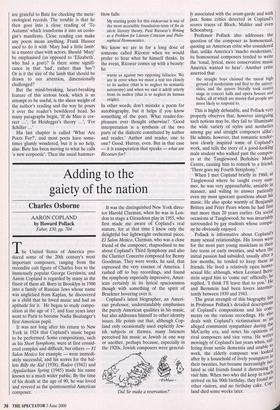Adding to the gaiety of the nation
Charles Osborne
AARON COPLAND by Howard Pollack Faber, £30, pp. 704 The United States of America pro- duced some of the 20th century's most important composers, ranging from the recondite cult figure of Charles Ives to the immensely popular George Gershwin, and Aaron Copland is regarded by many as the finest of them all. Born in Brooklyn in 1900 into a family of Russian Jews whose name was anglicised from Kaplan, he discovered as a child that he loved music and had an aptitude for it. He began to study compo- sition at the age of 17, and four years later went to Paris to become Nadia Boulanger's first American pupil.
It was not long after his return to New York in 1924 that Copland's music began to be performed. Some compositions, such as his Short Symphony, were at first consid- ered complex and difficult, but others —El Salon Mexico for example — were immedi- ately successful, and his scores for the bal- lets Billy the Kid (1938), Rodeo (1942) and Appalachian Spring (1945) made his name known to a much wider public. By the time of his death at the age of 90, he was loved and revered as the quintessential American composer. It was the distinguished New York direc- tor Harold Clurman, when he was in Lon- don to stage a Giraudoux play in 1955, who first made me aware of Copland's real stature, for at that time I knew only the delightful but lightweight orchestral piece, El Salon Mexico. Clurman, who was a close friend of the composer, rhapsodised to me about Copland's Third Symphony and also the Clarinet Concerto composed for Benny Goodman.. They were works, he said, that expressed the very essence of America. I rushed off to buy recordings, and found the symphony especially impressive, Amer- ican certainly in its lyrical spaciousness though with something of the spirit of Bruckner hovering over it.
Copland's latest biographer, an Ameri- can professor, understandably emphasises the purely American qualities in his music, but also addresses himself to other identity issues. He points out that, although Cop- land only occasionally used explicitly Jew- ish subjects or themes, many listeners perceived his music as Jewish in one way or another, perhaps because, especially in the 1920s, Jewish composers were general- `Did Sir make a reservation?' ly associated with the avant-garde and with jazz. Some critics detected in Copland's scores traces of Bloch, Mahler and even Schoenberg.
Professor Pollack also addresses the question of the composer as homosexual, quoting an American critic who considered that, unlike America's 'macho modernists,' its homosexual composers tended to write the 'tonal, lyrical, more conservative music America wanted to hear'. Another critic asserted that the straight boys claimed the moral high ground of modernism and fled to the univer- sities, and the queers literally took centre stage in concert halls and opera houses and ballet, all of which are musics that people are more likely to respond to.
This is highly debatable, and Pollack very properly observes that, however intriguing such notions may be, they fail to 'illuminate the wide variety of styles and aesthetics among gay and straight composers alike'. He admits, however, that romantic tender- ness clearly inspired some of Copland's work, and tells the story of a good-looking male student who walked past the compos- er at the Tanglewood Berkshire Music Centre, causing him to remark to a friend, `There goes my Fourth Symphony.' When I met Copland briefly in 1960, at Tanglewood where he taught every sum- mer, he was very approachable, amiable in manner, and willing to answer patiently even my most ignorant questions about his music. He also spoke warmly of Benjamin Britten and Peter Pears whom he had first met more than 20 years earlier. On social occasions at Tanglewood, he was invariably surrounded by gay students whose compa- ny he obviously enjoyed. Pollack is informative about Copland's many sexual relationships. His lovers were for the most part young musicians in their late teens or early twenties, and when the initial passion had subsided, usually after a few months, he tended to keep them as friends. He lived a relatively open homo- sexual life; although, when Leonard Bern- stein urged him to 'come out' officially, he replied, 'I think I'll leave that to you.' He and Bernstein had been lovers intermit' tently between 1939 and 1943. The great strength of this biography lies in Professor Pollack's detailed descriptions of Copland's compositions and his com- ments on the various recordings. He also deals with Copland's victimisation as an alleged communist sympathiser during the McCarthy era, and notes his opinions of rival composers and vice versa. He writes movingly of Copland's last years when, suf- fering from senile dementia and unable to work, the elderly composer was looked after by a household of lively youngsters. In their twenties, but became increasingly is°- lated as old friends found it distressing t,_° visit him. When two who did keep in touch arrived on his 90th birthday, they found no other visitors, and no birthday cake. Cop land died some weeks later.





































































 Previous page
Previous page